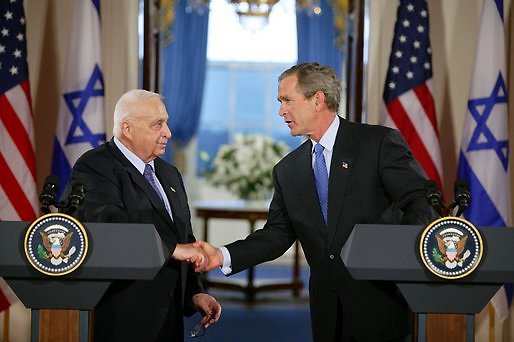![]()
Oct 7, 2001 | By Shimon Schiffer and Nahum Barnea
Sharon’s Statement on Czechoslovakia – Background
This article originally ran in Tel Aviv’s daily newspaper Yedioth Ahronoth on October 7, 2001. It was re-published on October 10, 2001 in Israel Resource Review. You can read Ariel Sharon’s statement here, as published on the website of the Embassy of Israel in Washington D.C. (Israel Ministry of Foreign Affairs).
Sometimes it is wise to go back in history. This happened in 2001. Do you see much difference between what happened with Bush and Sharon and what is happening now between Obama and Netanyahu? The subversive elements in the US-Israeli relationship have been playing their role much longer than we often think, where its interests are paramount. Disconcerting to see how dependent the U.S. Government is on the Israelis when it comes to understanding the Arab Islamic culture and it’s Islamic terrorism as result. Israel has warned in time for Iran’s nuclear ambitions and understood what danger threatens the world even before Ahmadinejad demanded his role on Iran’s political platform. Read this background story.
On Thursday, German Foreign Minister Joschka Fischer telephoned Prime Minister Ariel Sharon. Fischer was excited, and told Sharon:
“I spoke with Bashar Assad. He told me that Syria has always been against terror. You have no idea how touched I was, hearing such things from the Syrian president.”
Sharon was furious. Suddenly hearing that Syria is against terror, and has “always” been against terror. The serial terror enemy! And how did the German foreign minister react to those lies? With excitement.
On the heels of this introduction, there naturally came a request from Israel.
“You have to make concessions to the Palestinians,” said Fischer. “These concessions my be painful for your generation, but they will guarantee a better future for the next generations.”
Several hours later, Sharon Spoke at a press conference and accused the West, headed by the US, that it is delivering Israel over to terror just as the West handed over Czechoslovakia to Hitler in Munich in 1938. The conversation with Fischer was like waving a red flag, one of many. For weeks Sharon had been drawing near an explosion of this kind.
Sharon’s statements sparked a great deal of anger in Washington. White House Spokesman Ari Fleischer said that President Bush views Sharon’s statements as unacceptable. He was asked why President Bush had not been in touch with Sharon. After all, Israel and the US are allies. Fleischer answered, “This is not the time.”
There were five phone calls between Sharon and Secretary of State Colin Powell since Sharon spoke at the press conference. Sharon’s bureau issued a calming message. The former ambassador, Zalman Shoval, was called upon to explain that Sharon did not mean what he said, in actual point of fact. Powell, for his part, gave a damage control interview to AP, saying that occasionally there are clouds in the relationship between Israel and the US, but that they do not affect their intensity.
However, at the same time, officials at the State Department did their utmost to inflate the incident. The officials there have an agenda of their own. America is currently at a very sensitive juncture, between a lethal terror blow and the opening of a war. The world is divided into good buys and bad guys, and President Bush is the leader of the good guys. The link Sharon made between him and the most terrible act of betrayal of the twentieth century was received, at best, with a astonishment.
“There is a moment when you discover things are being done behind your back,” said Sharon. “I decided, this far and no more. A war is soon to begin. Israel will be asked to make excessive concessions to the Palestinians. Should it refuse, it will be accused of undermining the war. It was the last possible moment.”
In order to understand the events leading to Sharon’s outburst, one has to return to September 11, 2001. In fact, the roots of the crisis predate the terror attack. Over the summer, the State Department prepared an American program for a comprehensive arrangement at the heart of which was a call for the establishment of a Palestinian state. Powell was to announce the principles of the plan in a speech to the UN General Assembly on September 19.
The plan was prepared behind Israel’s back. The Israeli government was surprised; it always is. Also in the past, at times that seemed to the Israeli government as the height of friendship and coordination, American plans were made behind its back with regard to the Palestinian issue. It happened with Carter, Reagan and Bush Sr. It did not happen with Clinton.
None of these plans were ever implemented in practice. They were all “still-born,” as Menahem Begin said of the Reagan plan. And that is exactly what Sharon would like to have happen to the new American plan. His statements were meant as a preemptive strike, before the American plan is revealed. They were meant as a deterrent and to make the lines of the American plan less binding.
The terror attacks in the US delayed the publication of plan, but also increased its proponents’ ambitions. Facing Israel in this struggle are not only the Arabists, who have taken over the management of Middle Eastern affairs at the State Department from Jews like Dennis Ross, but also Arab officials, headed by Prince Bandar Abu Sultan, Saudi Arabia’s all-powerful ambassador to Washington.
William Safire, the influential New York Times columnist, revealed last week, that the day following the terror attacks, Prince Bandar handled getting 14 of Bin Laden’s relatives, who were on US soil at the time, out of America. FBI investigators protested this action to their superiors, but their protest was of no avail. Safire wrote that the Saudi royal court had made sure to water down previous investigations into Bin Laden’s crimes as well. The Saudis were concerned that an in-depth investigation would lead to them, to the acts of corruption and surrendering to corruption which allow the Saudi court to survive.
Sharon claimed that from the moment the Americans decided to form a coalition against Bin Laden and to include Moslem countries in it, they put Israel on hold. In crisis situations Israel has always been changed from lawful spouse to concubine, but this time Israel was truly ignored, as though it does not even exist.
That is the case even though Sharon said that Israel has been providing the United States with “priceless” intelligence information about the Bin Laden front. Sharon gave instructions to put “everything” at the Americans’ disposal, both in terms of intelligence as well as in information on the combat methods of special units. Sharon says that, covertly, the Americans thank Israel every day for the crucial information it is providing them.
However, when US Secretary of Defense Donald Ramsfeld comes to the region, the only friendly country he does not visit is Israel. Ramsfeld telephoned his counterpart, Fuad Ben-Eliezer, and let him understand that Israel is not part of the plan. Sharon had a hard time swallowing that.
Sharon asked the Americans to include Hamas, Islamic Jihad and Hizbullah on the new list of terrorist organizations. The Americans refused, saying they are on the previous list. Sharon understood the refusal otherwise: In practice, the administration is distinguishing between what it defines as “global terror” (i.e., terror against America) and what it defines as “local terror” (i.e., terror against Israel).
The Americans want to include Iran in their coalition. Sharon views this American intention with deep concern, not simply because it involves the United States granting legitimacy to continued acts of terror by Hizbullah, but because it means granting legitimacy to the continued construction of Iran’s nuclear power, a power which adversely affects Israel’s strategic position.
And the main issue is the pressure with regard to Arafat. According to Sharon’s perception, on this point the administration has moved from ignoring to undermining. Bush and Powell pressured Sharon to authorize the Peres-Arafat meeting. When Sharon objected to a meeting under fire, they pressured Arafat to halt the terrorism. However, ever since Peres and Arafat had their joint photograph taken the Americans have disappeared. They stopped pressuring Arafat, who of course got the hint, and loosened the leash.
On Thursday, Sharon was at the Shikmim Farm. The news he received was grave. After the terror attack on the settlement of Elei Sinai, the firing at the square outside the Tomb of the Patriarchs and the shooting on the Ramot road in Jerusalem, came the terror attack in Afula, and on another level the terrible news of the plane downed over the Black Sea.
The Palestinian Authority issued a condemnation of the terror attack at Elei Sinai. Merely hours later, a Fatah activist entered the Afula central bus station and murdered civilians.
“After all that,” said Sharon, “Arafat is praised by the whole world for deigning to issue a condemnation. That is completely out of line.”
Sharon decided to cancel his attendance at an event at Menehmia in the Galilee, and instead to convene a press conference in Tel Aviv. The reason was the plane disaster. But when Sharon sat down to write his opening statements, he was thinking mainly of the Americans and Arafat.
The statement, including the mention of Munich, was written in his own hand, without prior consultations. Sharon erased only one sentence before stepping up to the microphone. The original statement said that he had decided to lower the flags in Israel to half-mast as a sign of mourning for the passengers who died in the plane crash. Sharon checked with the ministerial committee on ceremony, and was told that the Jewish customs preclude mourning during a holiday. Therefore, the flags remained flying at full mast.
“I held off and held off,” Sharon said. “I permitted the meeting between Peres and Arafat. After that, the Americans wanted Abu Ala and also Saeb Erekat. I allowed it. But there’s a limit. The moment a war begins, there will be an American delegate here with a program, and Israel will be presented as sabotaging the war effort.”
Sharon chose to reprimand the administration publicly instead of doing so quietly, over the telephone.
“Since when do we give the Americans speeches in advance?” he said.
On Friday, Sharon received information that the American ambassador to Tel Aviv, Dan Kurtzer, was briefing ministers against him. The ambassador explained that the prime minister’s speech was damaging to Israeli-US relations. Sharon also heard that Kurtzer was supposedly involved in briefings that were given to American journalists that included harsh criticism of the prime minister. The two spoke on the phone on Friday. Sharon reprimanded the ambassador.
“Imagine,” he told him, “that I were to call the Number Two of your embassy and speak against your actions to him. It would never occur to me to do that.” Kurtzer expressed regret.
The adversaries of the Sharon government in Washington, who have gained strength in recent weeks, do not perceive Sharon the way he perceives himself. They emphasize Sharon’s internal political problems, his increasing difficulty to maneuver between his government and the Left, and Binyamin Netanyahu breathing down his neck, and maybe also the police investigation about his campaign finances that is about to begin.
Sharon has a good many reasons to be angry with the Bush administration. He is convinced that the coalition that the Americans are trying to found will not come into being, and even if it does, it will not help the Americans in their fight against terrorism. To the Americans, the price that Israel is being asked to pay is perhaps very small, but to Sharon it is unbearable.
But it is doubtful whether he chose the right time for a confrontation with the President, and he certainly did not choose the right way. He could have planned a complex process, mobilizing Israel’s friends in the administration, Congress and the media or, alternatively, he could have tried to persuade Bush in private conversation. But Sharon chose to be right, not smart.
Sharon says that he does not regret his statements. “The supposed argument is behind us,” he said yesterday. If the United States opens fire on Afghanistan soon, it might be that he is right. The Munich crisis will be swept away, together with many other topics, in the great current of the war.



 RSS
RSS











Sharon's Statement on Czechoslovakia – Background | Middle East …: Israel has warned in time for Iran's nuclear … http://bit.ly/9fBnJP
[…] This post was mentioned on Twitter by njslea. njslea said: Sharon's Statement on Czechoslovakia – Background | Middle East …: Israel has warned in time for Iran's nuclear … http://bit.ly/9fBnJP […]
Background: Sharon's statement on Czechoslovakia #israel http://j.mp/cEaAzS
RT @CrethiPlethi: Background: Sharon's statement on Czechoslovakia #israel http://j.mp/cEaAzS